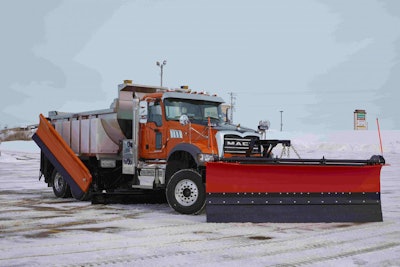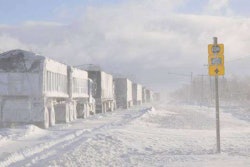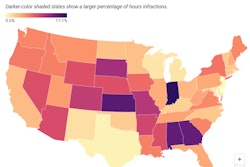 PennDOT clears more than 94,000 miles of snow lanes each snowfall in the winter.
PennDOT clears more than 94,000 miles of snow lanes each snowfall in the winter.Last winter was difficult for truckers hauling throughout much of the country, but especially in Pennsylvania. Restrictions were placed on commercial vehicles seven times by the state, either slowing or stopping truck travel altogether.
Sometimes the shutdowns were caused by an accumulation of snow, or snow combined with ice or high winds. There were also times truck travel was interrupted by just the threat of excessively foul weather.
Regardless of the reason, the truck restrictions prompted no small amount of consternation from drivers who were inconvenienced. Pennsylvania Department of Transportation officials say they were and are sensitive to trucker responses and hope new winter road closing criteria due out before the snow flies this winter will address driver concerns.
With winter weather just weeks away, PennDOT is preparing its resources to clear more than 94,000 miles of snow lanes — over 40,000 miles of highways in both directions, plus on/off ramps and other surfaces — this winter. It has refined its systems by which it notifies travelers of road conditions and the progress of its own 2,200 plows and the more than 400 private contractors it also uses.
Alexis Campbell, press secretary for PennDOT, recently said the department heard the frustration the trucking industry felt last year. She said the agency has had “a lot of really productive conversations with those folks as we prepare for this year. We’re engaged with all of those different stakeholders to make sure that the way that we’re implementing the restrictions makes sense and helps them be able to plan accordingly if they need to change routes or make other decisions.

Campbell noted a big reason for the restrictions is cutting down on crashes, especially crashes involving trucks that can cause bigger problems, such as blocked roadways and hazmat cleanup.
She said all the decisions to restrict traffic are based on forecasts and are made collaboratively between PennDOT, the Pennsylvania Turnpike Commission, the state police and PEMA, the state’s emergency management agency.
“As soon as the decision is made, we communicate that (to the public and especially truckers) so that they can plan. We do understand that the decisions to restrict certain kinds of traffic on the interstates and some of the limited access freeways has impacts to the industry.”
Campbell added that PennDOT and others also consult with the National Weather Service and AccuWeather, which is located in State College, Pennsylvania. Still, the decisions are often second-guessed.
A survey PennDOT conducted earlier this year found that people expect the agency “to come in and plow, and the roads (will be) perfectly clear, and they expect that to happen within one to four hours, which is, as we know, not possible,” Campbell said.










